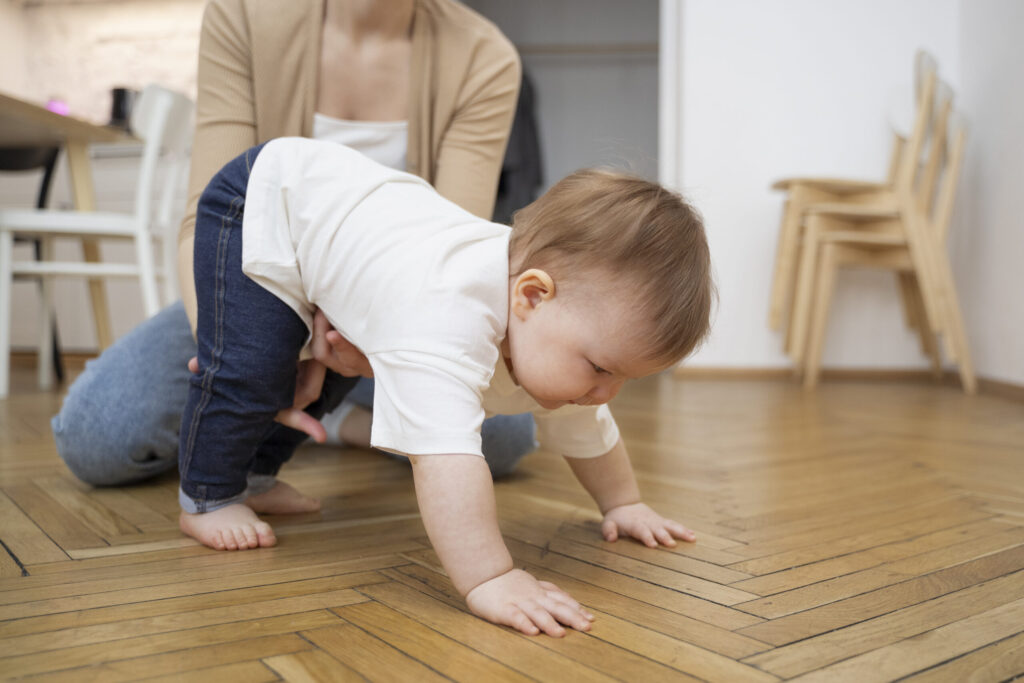What is crawling, and why is it important?
Crawling is a developmental milestone that most babies will reach by the age of 9 months. It is one of the gross motor milestones, and it is often considered a major milestone, recognized and celebrated by parents and caregivers alike.
Crawling involves a baby being able to put their weight on their arms and legs, with their stomach pointing towards the floor while propelling themselves forward. For babies, it is a huge step forward in terms of gaining more independence and mobility. For parents and caregivers, a mobile baby means everything is suddenly within their grasp, and the serious baby-proofing of a home or care environment must begin.
Crawling is considered necessary in terms of a baby’s development, not simply for what it means in terms of their physical and gross motor development. Crawling is now known to impact all areas of a baby’s development, including their balance, sensory system, coordination, problem-solving, and cognitive skills.
What is a crawling delay?
A crawling delay might be diagnosed if a baby is not crawling by a certain age. However, in general, the issue is a little more complicated than that. Some babies never crawl, and many times this is not the sign of a crawling delay, nor is it a reason to be concerned. In the field of child development, it is widely recognized that some babies miss the crawling stage completely.
Generally, a crawling delay or absence of crawling is not a red flag in itself. However, suppose your baby is also not meeting other physical and gross motor milestones and is showing signs of delay in other areas of their development. In that case, there may be cause for further investigation.
The normal baby crawling age ranges from 6 to 10 months, but some babies may take a little longer, depending on their individual development. If by ten months or so your child is not crawling but can pull to standing, using furniture to assist them, cruise or move from a piece of furniture to another, or ‘scoot’ and move themselves around on their bottom or while flat on their tummy, then their gross motor development would be considered normal.
What are some of the possible causes of a crawling delay?
- Premature birth: If your child was born prematurely, their developmental age might differ from their actual age. According to their due date, tracking their development rather than their birth date may show they are meeting their milestones. Premature babies may also sometimes develop their muscles more slowly.
- Environment: Does your child have opportunities to practice their gross motor and crawling skills? This means opportunities for tummy time, time spent on the floor, or on a play mat. Babies who spend large amounts of time constrained in a stroller or chair will have fewer opportunities to play and move, both of which are crucial in developing their gross motor skills.
- An underlying health condition or genetic syndrome: in some cases, a gross motor delay may be a sign of a rare disease. Pitt-Hopkins is one such syndrome. In this case, further investigation, including genetic counseling and genetic analysis, may be necessary to understand the delay’s cause.
How Can I Help My Baby Learn to Crawl?
If you’re concerned about a crawling delay, there are simple, supportive activities you can try at home. One effective tip is to encourage regular tummy time during your baby’s awake hours. This helps strengthen their neck, shoulders, and core muscles essential for crawling. Start with a few minutes a couple of times a day and gradually increase as your baby becomes more comfortable. You can also place a favorite toy just out of reach to motivate them to move forward. Always supervise your baby closely and celebrate small progress to make the experience positive and stress-free.
If you have any concerns about your child’s development – their crawling or any other skill – contact your family doctor, pediatrician, or other medical professionals that you trust.



